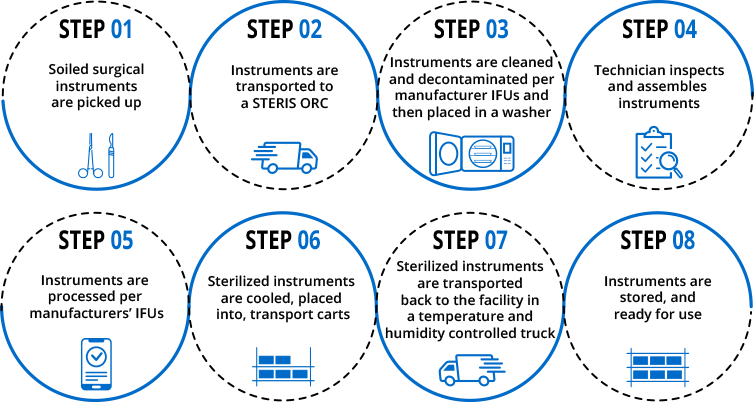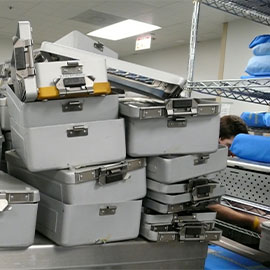Knowledge Center
October 28, 2024
What is Offsite Reprocessing?
The Sterile Processing Department (SPD) is a highly critical department at a healthcare facility. The SPD is responsible for cleaning, decontaminating, sterilizing, and preparing surgical instruments for the Operating Room (OR). Many SPDs face daily challenges, from influxes in surgical case volumes and staffing shortages to processing more complex surgical instrument trays. Healthcare facilities are considering consolidating reprocessing within a health system or out to a third-party provider to standardize and streamline sterile processing processes.
Offsite Reprocessing Centers (ORCs) are standalone facilities where healthcare facilities can send their soiled surgical instrument trays to be processed for cleaning and/or sterilization. Instruments are transported to an ORC via a temperature and humidity-controlled truck, where technicians will process surgical instruments based on manufacturers' Instructions for Use (IFUs). Once instruments are fully processed, sterile processing technicians prepare and pack them to be transported back to the healthcare facility, procedure-ready.

Sterile Processing Strategy: Onsite, Centralized, Mobile, or Offsite Reprocessing
The SPD is an important piece in the OR Supply Chain. Without the SPD's prompt supply of sterile surgical trays, the OR could not start surgeries on time or conduct as many surgeries in its busy schedule. Thus, it is of great importance that the SPD provides efficient and reliable instrument processing.1 There are many avenues an SPD can choose to reprocess their surgical instruments, and there are many factors a facility should consider before developing a reprocessing strategy. Common reprocessing options include:
Onsite Reprocessing – Cleaning and sterilization of instruments and medical devices within the existing four walls of the hospital.
Centralized Reprocessing – SPD operations are centralized within one facility, such as a main hospital campus. The centralized SPD receives the soiled instruments from other facilities, processes them, and then transports them back to the SPD.
Offsite Reprocessing – An offsite location owned and operated by the health system or a third-party surgical instrument reprocessing company. Instruments are transported offsite to an ORC, where technicians process the instruments and transport them back to a healthcare facility. These facilities have the capability to supplement a facility's SPD operations temporarily or long-term.
Mobile Reprocessing – A fully integrated, mobile central SPD allows a turnkey process to continually support the OR without disruption during hospital construction, renovation, or expansion. Mobile units are equipped to provide high performance, productivity, and standards for reprocessing instruments.
Offsite vs. Onsite Reprocessing

While SPDs can vary in physical size, staff, and volume of surgical instruments processed, the OR cannot perform surgeries without the timely supply of procedure-ready trays. Reprocessing surgical instruments onsite can reduce the processing turnaround time, eliminating the need to transport instruments to and from the healthcare facility. Alternatively, offsite reprocessing can help address SPDs' biggest challenges, such as space constraints, increased procedure volumes, reprocessing complex vendor-loaned instrument trays, staffing, and education.
Emergency Support
In an ideal world, SPDs would be prepared to process instruments safely, regardless of the circumstances. Increased processing capacity, utility issues, or slight contamination in the water from natural disasters are challenging to plan for. These events can cause SPD downtime, which can have devastating effects on your facility. Utilizing an offsite reprocessing partner can provide healthcare facilities with emergency support for both the short and long term, allowing an SPD to continue with daily operations with enhanced support from a partner.
Benefits of Offsite Reprocessing
There are several benefits to offsite reprocessing that can help address the challenges of your in-house SPD, including:
- Helps reduce daily instrument tray backlogs due to SPD capacity constraints
- Improve compliant vendor tray management and processing against manufacturers' IFUs
- Meet current surgical case volumes and be prepared for future surgical volume growth
- Provide ongoing contingency for SPD services in times of emergency (steam issues, equipment shutdowns, etc.)
- Improve instrument tray quality indicators and enhance regulatory compliance
- Helps assist when SPDs struggle to maintain trained and experienced SPD staff
Offsite Reprocessing Considerations
When considering if offsite reprocessing is the right option for your healthcare facility, some things to consider include:
Staffing and Education - Have you experienced high SPD staff and leadership turnover? What is your ability to retain and educate staff in your SPD? Is it hard to find and retain sterile processing technicians or managers? Are there current gaps in staff training and education that impact overall quality? In times of staffing shortages, SPD technicians may feel the burden of processing surgical instruments faster, which can result in mistakes that impact the OR and potentially a patient's safety.
 Procedure Volume - Can your department manage the daily procedure volume from a space and equipment perspective? Are you prepared for future anticipated volumes? Does the lack of space create tray backlogs and impact overall quality?
Procedure Volume - Can your department manage the daily procedure volume from a space and equipment perspective? Are you prepared for future anticipated volumes? Does the lack of space create tray backlogs and impact overall quality?
Increase in Surgical Instrument Processing Complexities - Can you process complex instrument trays? Surgical instruments for minimally invasive procedures are becoming more difficult to process, and the demand for training and expertise among SPD staff has increased due to surgical instrument advancements. As equipment and instruments in the OR evolve, SPD staff must continuously stay updated on following IFUs to ensure instrumentation has been processed to the validated requirements to ensure they provide a safe and successful patient outcome.
Compliance - Does your SPD have challenges maintaining regulatory standards?
Inventory - Additional surgical instruments could be needed when going offsite to account for a longer reprocessing turnaround time
Before transitioning to an ORC, a healthcare facility should assess its current process and identify what is working versus what is not. Once this assessment is complete, leadership can identify if onsite or offsite reprocessing provides the opportunity to streamline operations to increase efficiencies.
Decisions to Make Before Utilizing an Offsite Reprocessing Partner
Before a healthcare facility decides to reprocess trays offsite, they should confirm their desired outcome. Once confirmed, there are several factors a facility should consider before moving to an offsite reprocessing service to ensure there is no impact on overall quality. First, evaluate your current procedure volumes and what procedures you anticipate will be performed. Second, consider the logistics of moving instrument trays offsite and the importance of technology when managing reprocessing offsite relationships — lastly, consider what onsite staffing requirements will remain. Moving instrument reprocessing, either temporarily or permanently, will be a shift for a healthcare facility and require proper staff training and clear communication to all parties.
Whether reprocessing is performed onsite or offsite, efficient SPD processes require a team to assess their current quality procedures and plan their processes to ensure they adhere to AAMI and AORN guidelines.
Finding an Offsite Processing Service Near You
From short-term, immediate needs to long-term capacity support, STERIS Offsite Reprocessing Services help address SPD challenges and provide expanded offerings to meet your sterile reprocessing needs.
Explore STERIS Offsite Reprocessing Services
Contributors

Liz Carvill
Vice President – Offsite Reprocessing Solutions, STERIS
![]()
Liz is a seasoned healthcare leader with extensive experience in leading the design, build, transitional preparation, and operational commencement of sterilization services to Offsite Reprocessing Centers.


